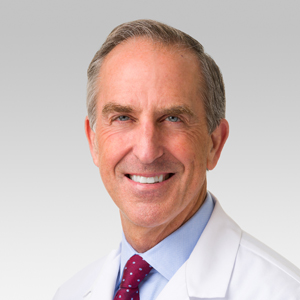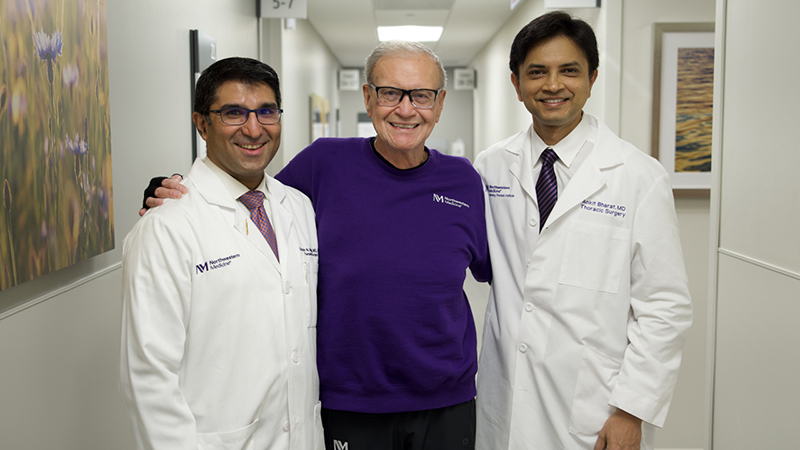Telemundo Meteorologist Beats Breast Cancer
Published September 2021
Maricela Vázquez Shares Importance of Regular Breast Screening
When Maricela Vázquez, a Telemundo meteorologist, got the phone call that she had breast cancer, she was on a commercial break. The first thing she asked her physician was, "Am I going to die?"
Thirty minutes later, she was on air, smiling and pretending that everything was fine while she gave the afternoon weather report for the Chicagoland area.
Maricela was 40 when she was diagnosed with breast cancer. She had no family history of breast cancer — or any cancer. She tested negative for genetic mutations that may increase risk of breast cancer in a 16-gene panel. She felt no lumps or pain in her breasts. She was an active mom of two boys and on top of her health; getting her first mammogram at age 40.
Don't put off your screenings, and stop making excuses.— Maricela Vázquez
Maricela's regular mammogram showed abnormal tissue. If abnormal tissue is detected during a mammogram, your physician may suggest further screening, likely in the form of a biopsy, during which a tissue sample is taken and tested for cancerous cells.
Maricela's biopsy determined that she had breast cancer.
Thanks to that mammogram, Maricela's care team was able to catch her breast cancer early, in stage 1. Maricela's breast cancer was localized, meaning she had a five-year relative survival rate of 99%, according to American Cancer Society.
ACS reports that many decades of research on mammograms show women who have regular mammograms are more likely to have their breast cancer detected early, less likely to need aggressive treatment like surgery to remove one or both breasts (mastectomy or double mastectomy) or chemotherapy, and more likely to survive breast cancer.
"I was blown away that this preventive technology could catch my tumor so early in its progression," Maricela says. "I was also blown away by how quickly my Northwestern Medicine teams worked to get me the care that I needed right away."
Straight to Surgery

Maricela went in for a lumpectomy with Northwestern Medicine and Robert H. Lurie Comprehensive Cancer Center of Northwestern University Breast Surgeon Kevin P. Bethke, MD.
"People often think they need a single or double mastectomy when they have a breast cancer diagnosis, but often we are able to remove the tumor and cancerous tissue with a lumpectomy, preserving as much breast tissue as possible," says Dr. Bethke. "In Maricela's case, we removed the tumor, the surrounding tissue and three of her sentinel lymph nodes."
With her tumor gone, Maricela started 20 sessions of radiation therapy. Her Northwestern Medicine and Lurie Cancer Center Medical Oncologist William J. Gradishar, MD, determined that Maricela would not need chemotherapy.
Mom on the Mend

Maricela is no stranger to balancing caring for herself with caring for her children. When she was getting her degree in meteorology from Mississippi State University, she was pregnant with her oldest son and working full time on top of going to school.
"My husband helped a lot," she says.
While Maricela took time off work in order to take care of herself during her radiation treatments, she still scheduled her treatments around the activities of her 14- and 7-year-old sons so she was able to take care of them when they came home from school.
"I would get my treatment in the morning and then nap for two to three hours so that I could feel better in order to take care of my kids when they came home from school," she says. "It was difficult, but I recognized this time as a chance for my body to get better."
The Second Call and a Call to Action for Women
Maricela got another memorable call during a Chicago Telemundo news broadcast commercial break — this time letting her know she was cancer free.
"The whole studio was screaming and jumping up and down and celebrating on set," she says. "Then, we had to be quiet on set for the broadcast."
Maricela hopes other women can learn from her story.
"Moms always use their kids as excuses for not taking care of themselves, but you should prioritize your health so that you are able to be around for your kids in the long run and set a good example of health for them," she says "All women have to make sure they are on top of their health. Don't put off your screenings, and stop making excuses."
As a Mexican American woman, Maricela also hopes to encourage others to get regular screening. According to ACS, fewer Hispanic women get regular mammograms than non-Hispanic white women. Hispanic women are also less likely to receive appropriate and timely breast cancer treatment as compared to non-Hispanic white women. Though the gap is narrowing, Maricela hopes her story will encourage other Hispanic women to get regular mammograms and visit their primary care physician regularly in order to catch potentially life-threatening illnesses early.
"I feel so lucky that my doctors at Northwestern Medicine were so on top of my care," she says. "I never thought once that I needed a second opinion, because my Northwestern Medicine doctors had everything covered for me."







